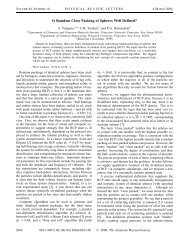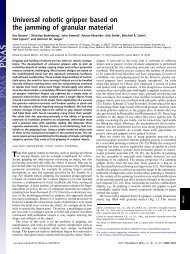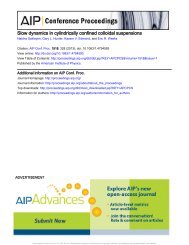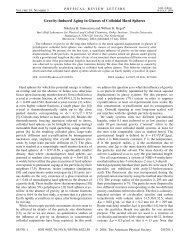Essay contest reveals misconceptions of high school ... - Genetics
Essay contest reveals misconceptions of high school ... - Genetics
Essay contest reveals misconceptions of high school ... - Genetics
Create successful ePaper yourself
Turn your PDF publications into a flip-book with our unique Google optimized e-Paper software.
<strong>Genetics</strong> Education 1163TABLE 6(Continued)Theme Quotation from student essay a Correct conceptionDeterministic nature <strong>of</strong>genetics‘‘Genes determine everything form your sex, and hair color, towhat diseases you many have and how <strong>high</strong> you will grow.’’‘‘If everyone on both sides <strong>of</strong> your family is tall, you are goingto be tall. If half are tall and half are short, you have a 50/50chance <strong>of</strong> being either tall or short. You also have thepossibility <strong>of</strong> being somewhere in the middle.’’Genes are not necessarily deterministic. More frequently,environmental influences coupled with genotypedetermine phenotype.This quotation appears to assume that single genes (perhapstaken from a simple Punnett square idea) determineheight. Indeed, multiple genes, nutrition, andenvironment all play a role.Nature <strong>of</strong> genes andgenetic material‘‘All humans have DNA, as do animals, plants, and mostbacteria and fungi.’’‘‘Much like iodine is frequently added to the salt we consume,natural pesticides, extra vitamins, and longer life spans canbe added to our fruits and vegetables.’’All living organisms, including bacteria and fungi, have DNA.Genetic modification <strong>of</strong> organisms is an extensive, lengthyprocess not analogous to the simple addition <strong>of</strong> a chemical.Genetic basis <strong>of</strong> disease ‘‘In the future knowledge about genetics could help stopdeadly diseases and cancers. However this will only helpwith diseases that are hereditary.’’Most illnesses have a genetic component without beinghereditary. Therefore, a knowledge <strong>of</strong> genetics could have amuch farther reach than this student recognizes. Indeed,the knowledge <strong>of</strong> the genetics <strong>of</strong> different viruses, forexample, has resulted in vaccines for strains <strong>of</strong> influenza(Webby et al. 2004).<strong>Genetics</strong> research ‘‘If I could be a human genetics researcher I would studymolecular genetics and how to alter it. One <strong>of</strong> the biggestproblems to humanity is disease and if by studying DNA andthe molecules that it is composed <strong>of</strong>, certain things couldbe stopped it would be well worth it.’’‘‘An experimental design I would like to try would to havepeople have the ability to hibernate in a frozen state,replicating the ability <strong>of</strong> the wood frog.’’While many geneticists study molecular genetics, they do so byfocusing on a particular process, gene, or other aspect <strong>of</strong>this broader topic. Moreover, there is <strong>of</strong>ten a large gapbetween the basic research ongoing in molecular geneticsand human disease prevention, treatment, and cure.In the 2007 guidelines, students were asked to include theirexperimental design (see Table 4). Only 11% <strong>of</strong> studentsanswering this question included any type <strong>of</strong> discussion ontheir experimental design. Moreover, students rarelyexhibited understanding <strong>of</strong> a rational, reasoned approachto a testable hypothesis.Reproductive technology ‘‘<strong>Genetics</strong> create a perfect being. Change the genes. Makethat child perfect. There’s no better solution to animpending health care crisis. A perfect child means thathealth care can be focused on an aging generation <strong>of</strong> people.What we can have is a sea <strong>of</strong> people who all look brilliant, whoare all smart and who all have perfect eyes, nose and lips. It’s aperfect society, what more could we want?’’The goal <strong>of</strong> genetics, genetic research, and reproductivetechnology is not eugenic in nature. While scientists andclinicians indeed want to identify mutations that result inhuman illness for subsequent development <strong>of</strong> effectivetreatments (and potential cures), their ultimate goal is notto presume to name the traits that would be consideredvaluable in society.aQuotations are copied directly from student text and not edited for correct grammar.



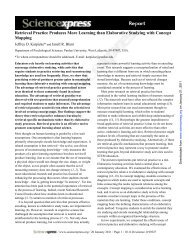
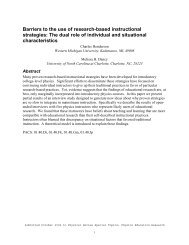
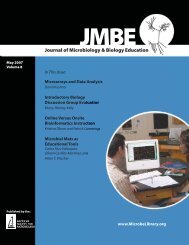
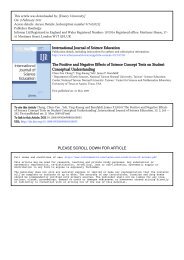
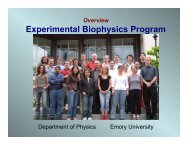
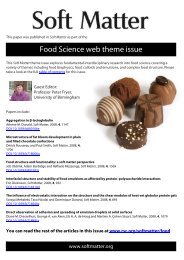

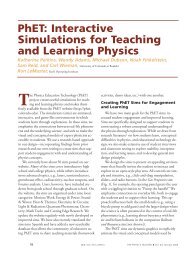
![view the Dish Show [PDF] - Department of Physics - Emory University](https://img.yumpu.com/45032745/1/190x146/view-the-dish-show-pdf-department-of-physics-emory-university.jpg?quality=85)
